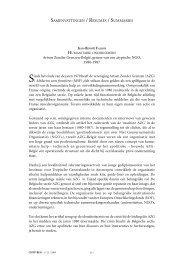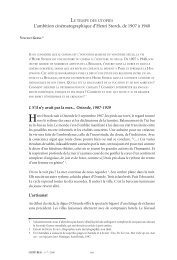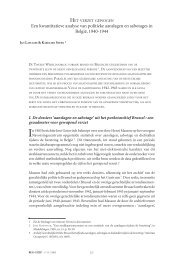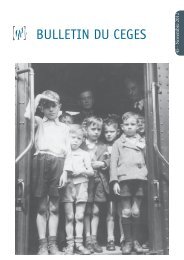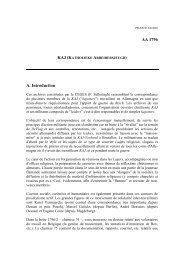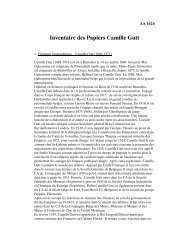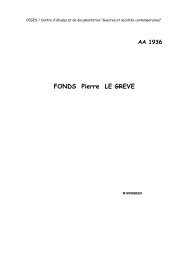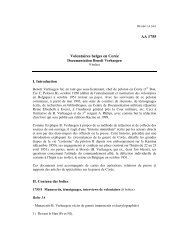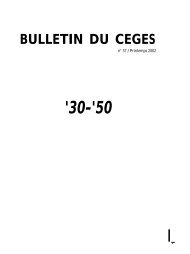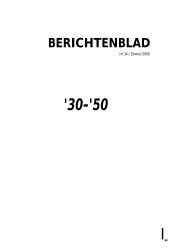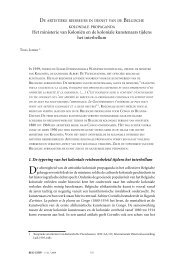les jeunes historiens ont la parole - Centre for Historical Research ...
les jeunes historiens ont la parole - Centre for Historical Research ...
les jeunes historiens ont la parole - Centre for Historical Research ...
Create successful ePaper yourself
Turn your PDF publications into a flip-book with our unique Google optimized e-Paper software.
Jasper DEBEUF<br />
(KULeuven)<br />
Studiedag voor jonge historici – Eerste Wereldoorlog – Tweede Wereldoorlog<br />
Journée d’étude “<strong>jeunes</strong> <strong>historiens</strong>” – Première Guerre mondiale – Seconde Guerre mondiale<br />
Een tikkende tijdbom.<br />
Het ‘Politieke Testament’ van Leopold III : redactie en receptie.<br />
The Political Testament of Leopold III was one of the key documents in Royal Question that<br />
determined the political <strong>la</strong>ndscape of Belgium in the post-war period from 1944 to 1950. As this<br />
study shows, the Belgian king decided not to follow his government in May 1940 after which the<br />
government falsely accused the king of treason. In the years after this incident Leopold refused to<br />
restore c<strong>ont</strong>act with the government. The government, aware of its mistakes, tried to re-establish<br />
c<strong>ont</strong>act one <strong>la</strong>st time in 1943 by the hands of messenger De Kinder. He succeeded and<br />
reconcilement seemed likely.<br />
But in meanwhile, Leopold had begun to write his Political Testament on January 24 th 1944. The<br />
document c<strong>ont</strong>ains c<strong>ont</strong>roversial <strong>la</strong>nguage towards the government in exile and even the allied<br />
<strong>for</strong>ces. The Belgian king regarded the Allies as a new occupant <strong>for</strong>ce and demanded the<br />
restoration of the Belgian independence. This part of the study extensively examines the editorial<br />
process of this Political Testament and the responses of those who read it be<strong>for</strong>e it was spread.<br />
The most important influence on the document came from his military advisor Van Overstraeten<br />
which exp<strong>la</strong>ins the strong <strong>la</strong>nguage, used by the king. This study will show that the king did not<br />
want to listen to the good advice of other men like his secretary Robert Capelle.<br />
The king was lead to Germany on the 7 th of June 1944 and the government in exile returned to<br />
Belgium in the beginning of September 1944. On arrival, the Prime Minister was immediately<br />
handed the Political Testament. But he found the document too perilous to publish, like the king<br />
intended to. The government, who only knew one chapter, decided to keep the document secret.<br />
But without their knowledge, the document was also handed to general M<strong>ont</strong>gomery, who<br />
delivered it to Churchill. This part of the study looks at all the different reactions from all the<br />
political figures who read it. Their reaction was almost entirely negative and thusly the domestic<br />
and <strong>for</strong>eign attitude towards the king changed. The <strong>la</strong>st part of this paper examines the slow<br />
process of publication in the press. Throughout a period of five years, several officials and<br />
journals published parts of the Political Testament. As this <strong>la</strong>st part will show that while most of<br />
the political figures regarded the document as one of the most dangerous documents that could<br />
determine the conclusion of the Royal Question, the press <strong>la</strong>rgely overlooked the importance of<br />
the document.<br />
38



